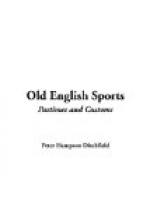Hurling, too, was a fast and furious game, very similar to our game of hockey, and played with sticks and a ball. Two neighbouring parishes used to compete, and the object was to drive the ball from some central spot to one, or other, village. The contest was keen and exciting; a ball was driven backwards and forwards, over hills, dales, hedges, and ditches, through bushes, briars, mires, plashes, and rivers, until at length the wished-for goal was gained. Battledore and shuttlecock were favourite games for the girls, which they played singing quaint rhymes—
“Great A, little
A;
This is pancake
day!”
and the men also indulged in tip-cat, or billet.
There is one other custom, of a most barbarous and cruel description, which was practised on Shrove Tuesday by our forefathers, and which happily has perished,[6] and that was throwing at cocks or hens with sticks. The poor bird was tied by the leg, and its tormentors stood twenty-two yards distant and had three throws each for twopence, winning the bird if they could knock it down. The cock was trained beforehand to avoid the sticks, so as to win more money for its brutal master. Well might a learned foreigner remark, “The English eat a certain cake on Shrove Tuesday, upon which they immediately run mad, and kill their poor cocks.” Cock-fighting was a favourite amusement on Shrove Tuesday, as well as at other times. This shameful and barbarous practice was continued until the eighteenth century; some of our kings took delight in it, and in the old grammar schools in the North of England it was sanctioned by the masters, who received from their scholars a small tax called “cock-fight dues.” Happily, with bull-baiting, bear-baiting, dog-fighting, and the like, this cruel and brutal pastime has ceased to exist. If we have lost some of the simple joys and cheerful light-heartedness of our forefathers, we have also happily lost some of their cruel disregard for the sufferings of animals, and abandoned such barbarous amusements as I have tried to describe. But the old sports of England were not all like these; the archery, running, leaping, wrestling, football, and other games in which our ancestors delighted, made the young men of England a manly and a sturdy race, and our nation mainly owes its greatness to the courage, manliness, and daring of her sons.
But Ash Wednesday has dawned, and all is still in town and village. The Shrove-tide feast is ended, and the days of fasting and of prayer have hushed the sounds of merriment and song.
CHAPTER III.
March.
“And now a solemn fast
we keep,
When earth wakes from
her winter sleep.”
“And he was clad in
cote and hode of grene;
A shefe of pecocke arrowes
bryght and shene
Under his belt he bare
ful thriftely,
Well could he dresse
his tackle yomanly;
His arrowes drouped
not with fethers lowe,
And in hande he bare
a myghty bowe.”




